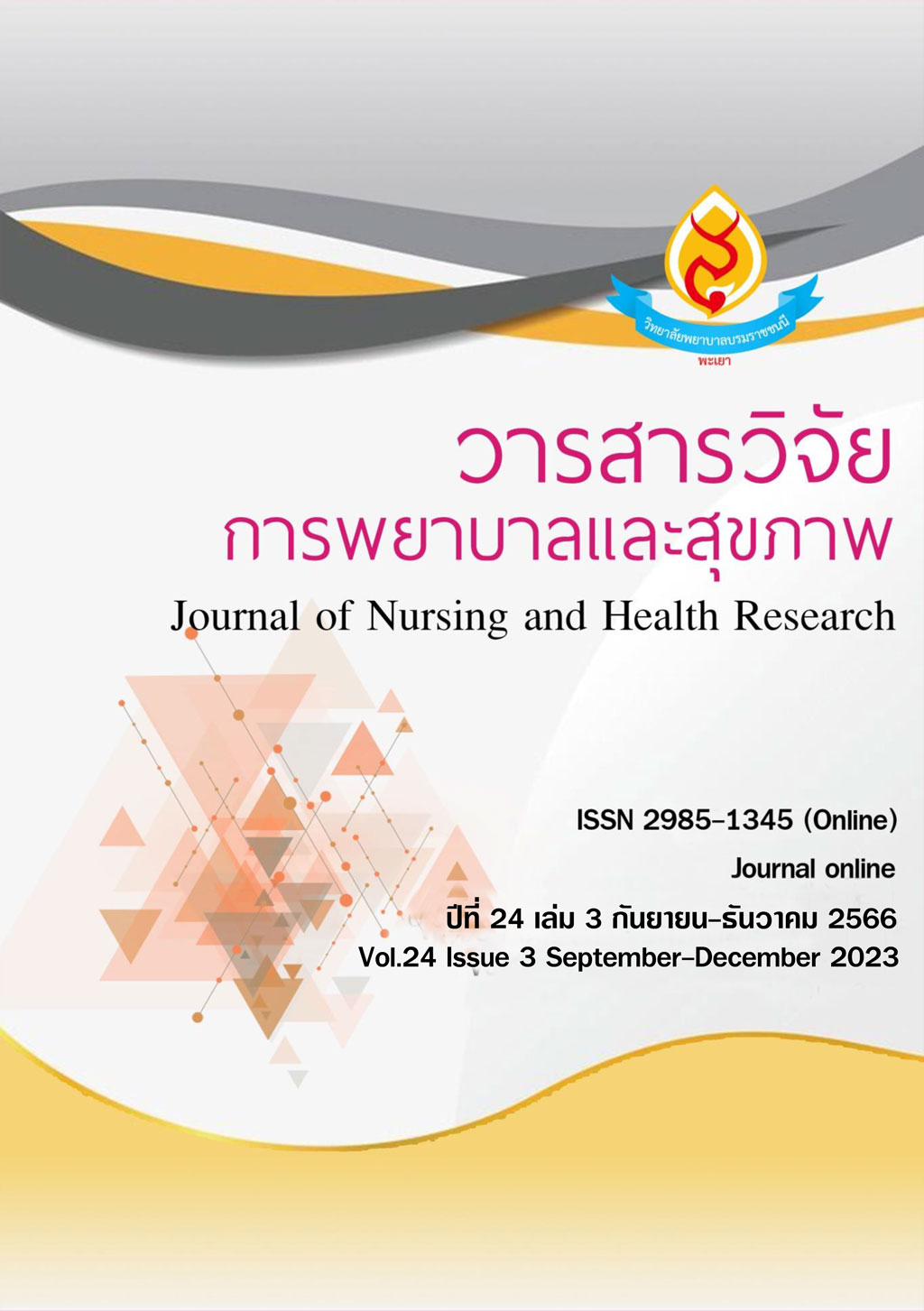ประสบการณ์ของพ่อแม่ในการจัดการพฤติกรรมที่ไม่พึงประสงค์ของเด็กปฐมวัย : การวิจัยเชิงคุณภาพแบบพรรณนา
คำสำคัญ:
พฤติกรรมไม่พึงประสงค์, รูปแบบ ABC, เด็กปฐมวัย, พ่อแม่บทคัดย่อ
การจัดการพฤติกรรมที่ไม่พึงประสงค์อย่างถูกต้องและมีประสิทธิผลในเด็กปฐมวัยจะช่วยป้องกันไม่ให้เกิดพฤติกรรมไม่พึงประสงค์ซ้ำ ๆ สามารถป้องกันไม่ให้เกิดผลกระทบทั้งระยะสั้นและระยะยาว การวิจัยเชิงคุณภาพ
แบบพรรณนาครั้งนี้เพื่อศึกษาการจัดการพฤติกรรมที่ไม่พึงประสงค์ของเด็กปฐมวัยตามรูปแบบ Antecedent-Behaviour-Consequence ABC อาสาสมัครการวิจัยเป็นพ่อหรือแม่ของเด็กปฐมวัยจำนวน 15 คน เก็บข้อมูลโดยการสัมภาษณ์
เชิงลึกกึ่งโครงสร้าง วิเคราะห์ข้อมูลโดยใช้เทคนิคการวิเคราะห์เชิงเนื้อหา ผลการวิจัย พบว่า พฤติกรรมที่ไม่พึงประสงค์ ในมุมมองของพ่อแม่มีทั้งหมด 5 กลุ่ม ได้แก่ ความก้าวร้าวและความรุนแรง เอาแต่ใจตนเองเจ้าอารมณ์ไม่มีเหตุผล การต่อต้านและฝ่าฝืนต่อคำสั่ง การฝ่าฝืนกฎ กติกา และมารยาททางสังคม และ บอกความต้องการทางอ้อม พ่อแม่ไม่เคยได้รับ
การฝึกอบรมการจัดการพฤติกรรมไม่พึงประสงค์โดยใช้รูปแบบ ABC ทำให้ไม่ได้ใช้กลยุทธ์อย่างเป็นระบบ และไม่ได้ใช้
กลยุทธ์อย่างสม่ำเสมอ ผู้ปกครองใช้กลยุทธ์ทั้งเชิงบวกและเชิงลบในการจัดการกับพฤติกรรม กลยุทธ์เชิงบวกที่ใช้ ได้แก่
การทำข้อตกลงกับเด็กก่อนการเกิดพฤติกรรม การรอ และการชมเชย กลยุทธ์เชิงลบ ได้แก่ การตอบสนองตามที่เด็กต้องการทุกอย่าง และการขาดการให้ข้อมูลย้อนกลับ การขาดความรู้และทักษะในการจัดการพฤติกรรมไม่พึงประสงค์ทำให้พ่อแม่ไม่สามารถใช้กลยุทธ์ก่อนเกิดพฤติกรรม ขณะเกิดพฤติกรรม และหลังเกิดพฤติกรรมได้อย่างมีประสิทธิภาพ จึงควรมี การจัดการฝึกอบรมโดยใช้รูปแบบ ABC สำหรับผู้ปกครอง
เอกสารอ้างอิง
Aksoy, P. (2020). The challenging behaviors faced by the preschool teachers in their classrooms, and the strategies and discipline approaches used against these behaviors: the sample of united states. Participatory Educational Research, 7(3), 79-104.
Chazin, K. T., & Ledford, J. R. (2016). Challenging behavior as communication. In Evidence-based instructional practices for young children with autism and other disabilities. Retrieved July 1, 2023. from http://ebip.vkcsites.org/challenging-behavior-as-communication/
Conroy, M. A., Sutherland, K. S., Algina, J., Werch, B., & Ladwig, C. (2018). Prevention and treatment of problem behaviors in young children: clinical implications from a randomized controlled trial of BEST in CLASS. AERA Open, 4(1), 1-16.
Doubet, S. L., & Ostrosky, M. M. (2015). The impact of challenging behavior on families: I don’t know what to do. Topics in Early Childhood Special Education, 34(4), 223-233.
Freedle, A., & Wahman, C. L. (2022). Understanding families’ experiences raising young children with challenging behavior through an ecological lens: a qualitative meta-synthesis. Topics in Early Childhood Special Education, 42(3), 269-281.
Frey, E., Bonfiglioli, C., Brunner, M. & Frawley, J. (2022). Parents' use of social media as a health information source for their children: a scoping review. Academic Pediatrics, 22(4), 526-539.
Gura, A. (2018). Challenging behavior, functioning difficulties, and quality of life of adults with intellectual disabilities. International Journal of Developmental Disabilities, 64(1), 45–52.
Hammerton, G., Murray, J., Maughan, B., Barros, F. C., Goncalves, H., Menezes, M.B., … Heron, J. (2019). Childhood behavioural problems and adverse outcomes in early adulthood: a comparison of Brazilian and British birth cohorts. Journal of Developmental and Life-Course Criminology, 5, 517–535.
Jiang, H. S., & Jones, S. Y. (2016). Practical strategies for minimizing challenging behaviors in the preschool classroom. Dimensions of early childhood, 44(3), 12-19.
Koritsas, S., & Lacono, T. (2012a). Challenging behaviour and associated risk factors: an interview (part 1). Advances in Mental Health in Intellectual Disabilities, 6(4), 199–214.
Koritsas, S., & Lacono, T. (2012b). Advances in mental health and intellectual disabilities emerald article: challenging behaviour: the causes (part II). Advances in Mental Health in Intellectual Disabilities, 6(5), 236–248.
Lambert, V. A. & Lambert, C. E. (2012). Qualitative descriptive research: An acceptable design. The Pacific Rim International Journal of Nursing Research, 16(4), 255-256.
Lee, J. D., Hacker, R. E., Meadan, H., Haidar, B.S. (2022) Challenging behaviors online modules for parents of young children with disabilities: a pilot feasibility study. Education & Treatment of Children, 45(4), 341-355.
Lulla, D., Mascarenhas, S. S., How, C. H., & Yeleswarapu, S.P. (2019). An approach to problem behaviours in children. Singapore Medical Journal, 60(4), 168-172.
McGilloway, S., Mhaille G. N., Bywater, T., Furlong, M., Leckey, Y., Kelly, P., …, Donnelly, M. (2012). A parenting intervention for childhood behavioral problems: a randomized controlled trial in disadvantaged community-based settings. Journal of Consulting and Clinical Psychology. 80(1): 116-127.
Meadan, H., Ayvaz, S., & Ostrosky, M. M. (2014). The ABCs of challenging behavior: understanding basic concepts. Young Exceptional Children, 19(1), 3-15.
Mora, T., & Trapero-Bertran, M. (2018). The influence of education on the access to childhood immunization: the case of Spain. BMC Public Health, 18(1). 1-9.
Ogundele, M. O. (2018). Behavioural and emotional disorders in childhood: a brief overview for paediatricians. World Journal of Clinical Pediatrics, 7(1), 9-26.
Patmaik, S., Sharma, U., & Subban, P. (2022). Who is responsible for students’ challenging behaviour? a study of the causal attributions of teachers to challenging behaviour in primary schools in West Bengal, India. Disabilities, 2(1), 56-72.
Ringer, N., Wilder, J., Scheja, M., & Gustavsson, A. (2020). Managing children with challenging behaviours. Parents’ meaning-making processes in relation to their children’s ADHD diagnosis. International Journal of Disability, Development and Education, 67(4), 376-392.
Sandelowski M. (2000). Whatever happened to qualitative description?. Research in Nursing & Health, 23(4), 334-340.
Schwartz, C., Waddell, C., Barican, J., Andres, C., & Gray-Grant, D. (2016). Helping children with behaviour problems. Children’s Mental Health Research Quarterly, 10(1), 1–20.
Shukla-Mehta, S., & Albin, R. W. (2002). Understanding behavioral escalation: From theory to practice. Behavioral Development Bulletin, 11(1), 19-26.
Staff, A. I., Van Den Hoofdakker, B. J., Van Der Oord, S., Hornstra, R., Hoekstra, P. J., Twisk, J. W. R., . . . Luman, M. (2021). Effectiveness of specific techniques in behavioral teacher training for childhood ADHD: a radomized controlled microtrial. Journal of Clinical Child Adolescent Psychology, 50(6), 763-779.
Tanwar, K., & Priyanka, M. (2016). Impact of media violence on children’s aggressive behaviour. Indian Journal of Research, 5(6), 241-245.
Teekavanice, S., Chantaratin, S., Sirisakpanit, S., & Tarugsa J. (2017). Prevalence and factors related to behavioral and emotional problems among preschool children in Bangkok, Thailand, Journal of the Medical Association of Thailand, 100(2), 175-182.
Wolkorte, R. R., Houwelingen, I. V., & Kroezen M. (2019). Challenging behaviours: Views and references of people with intellectual disabilities. Journal of Applied Research in Intellectual Disabilities, 32(6), 1421-1427.
ดาวน์โหลด
เผยแพร่แล้ว
รูปแบบการอ้างอิง
ฉบับ
ประเภทบทความ
สัญญาอนุญาต
ลิขสิทธิ์ (c) 2023 วารสารวิจัยการพยาบาลและสุขภาพ

อนุญาตภายใต้เงื่อนไข Creative Commons Attribution-NonCommercial-NoDerivatives 4.0 International License.



